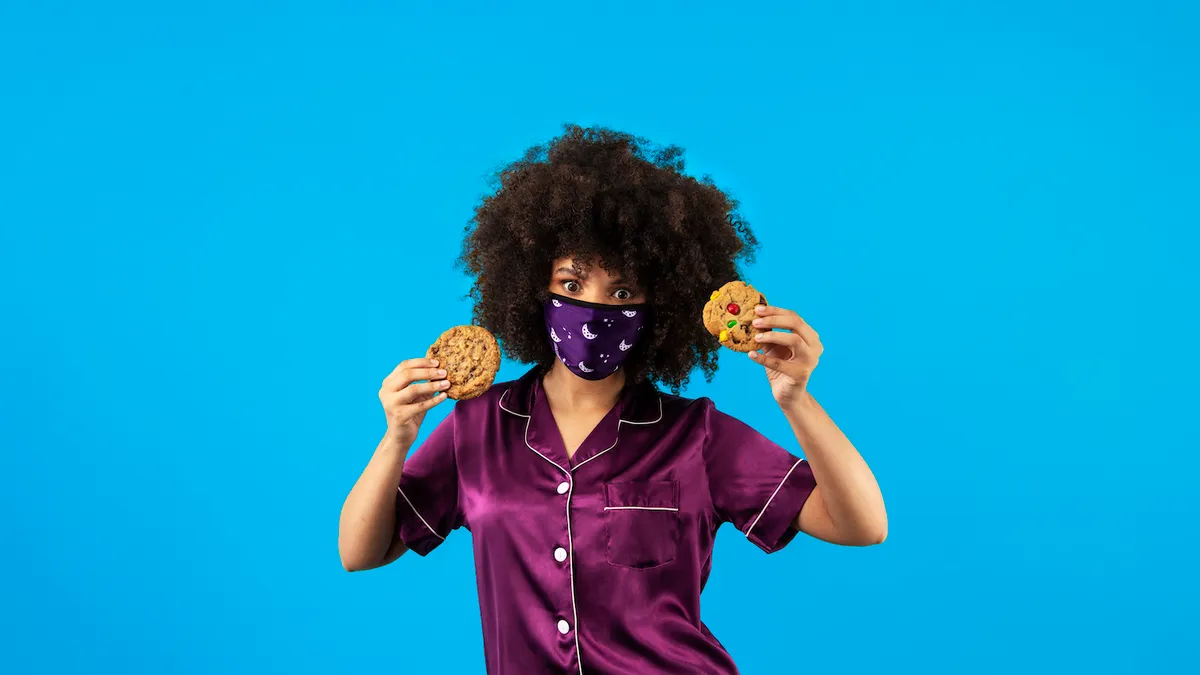Brief:
- Insomnia Cookies launched a social media campaign for its yearly pajama party that was revamped because of the coronavirus pandemic, according to an announcement emailed to Mobile Marketer. Instead of urging people to pack into its stores while wearing their pajamas to get free cookies, the Krispy Kreme-owned bakery chain offered customers designer face masks called "mouth pajamas."
- As part of the campaign, Insomnia released a short music video on social video app TikTok that features rapper Leese B. performing an original song, wearing her mouth pajamas and enjoying freshly baked cookies. Insomnia also posted an augmented reality (AR) face filter on Instagram that lets users of the photo-sharing app virtually try on different styles of masks.
- Insomnia offered free mouth pajamas to the first 50 people who ordered cookies from each of its locations for delivery on Sept. 22, the day of the pajama party. Insomnia worked with creative agency Red Tettemer O'Connell + Partners on the TikTok video, Instagram AR filter and other parts of the campaign, per the announcement.
Insight:
Insomnia Cookies' social media campaign aimed to reach Generation Z consumers who tend to be heavy users of apps such as Instagram and TikTok. The bakery chain got its start providing late-night cookie delivery to college students, and expanded to 175 locations that also serve walk-in customers. With students returning to colleges that want to avoid becoming COVID-19 hotspots, Insomnia developed the offbeat mouth pajamas promotion to urge people to order for delivery instead of visiting stores. The reimagined campaign is another another sign of how the health crisis has affected marketers' experiential activations.
"In light of COVID-19, we needed to rethink our previous strategy of encouraging Insomniacs across college campuses and beyond to pack into our stores in pajamas for free cookies," Tom Carusona, Insomnia Cookies CMO, said in the release. "We wanted to continue building our community of Insomniacs, while recognizing today's reality."
Insomnia's TikTok video has been viewed fewer than 2,000 times, which indicates the company didn't heavily promote the one-day offer of free mouth pajamas on the social video app. While similar efforts have yielded millions and even billions of views thanks to promotions on the app, the low view count signal that the company hesitated to invest in the TikTok element amid the app's uncertain future in the U.S.
By developing an AR filter for Instagram, Insomnia sought to engage users of the photo-sharing app with an immersive branded experience. It's not clear how many Instagram users tried the AR effects, which parent company Facebook is supporting with the development of its Spark AR platform for creators. Rival social media company Snap has said that more than 180 million of Snapchat's 238 million users engaged with its AR features each day in Q2, a sign of the popularity of AR content.
Insomnia is the latest brand to engage with consumers by providing face masks, which have become daily necessities during the pandemic and whose appearances in ads aren't viewed negatively by consumers. Retailer Snipes yesterday rolled out in-store kiosks that share voter registration links and dispense reusable Snipes and Puma-branded masks.
It is also the latest company to offer merchandise in its promotional efforts aimed at young adults and teens, a strategy to support affinities with familiar brands. Among the more recent examples, packaged foods company Kellogg this week started a social media promotion to give away "Flave-of-the-Day Socks" in cereal kits with a flavor for each day of the week. Before that, General Mills and Champion Athleticwear partnered on a capsule collection of activewear inspired by General Mills cereals. Fast-fashion retailer Forever 21 last month worked with 7-Eleven on a clothing line inspired by the convenience store chain's products, including its signature Slurpee and Big Gulp drinks.












